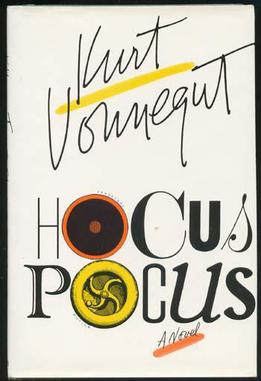 |
| Image courtesy of www.wikipedia.com |
Kurt Vonnegut
1990
The Summary
Hocus Pocus chronicles the chaotic life of Eugene Debs Hartke, a professional soldier turned college instructor turned prison warden turned prison inmate.
The Good
Kurt Vonnegut knows how to show you a good time in his novel. Not only can he point out the sheer absurdity of human nature, but he can make you laugh at the comic possibilities of the future and the way the world turns out.
You'll be in no shortage of laughter, when you pick up Hocus Pocus.
Additionally, Vonnegut fabricates his narrator into an oddly likable character. He cheats on his wife, he participates in a prison riot (not really), he habitually lies to others, he ends his narrative with a math equation - but, despite this, he writes a fairly compelling and amusing story.
His refusal to use words instead of numerals, his unusual capitalization habits, and his ability to abstain from swearing are strangely endearing.
And Hartke has a dark sense of humor. You almost can't help laughing, especially when he describes certain crises the world faces or his children's animosity toward him for reproducing.
The Bad
Despite the endearing oddities of Hocus Pocus, the novel does contain an element of violence and human absurdity that might make you want to tear your hair out. Human morality seems compromised, social justice has no bearing, and equality seems, more or less, thrown out the window. And Hartke exists right in the middle of it all.
It's absurd and sad simultaneously, a tragedy with a comic twist.
The Ugly
Sadly, the world just isn't what it used to be - if it ever was what it used to be.


